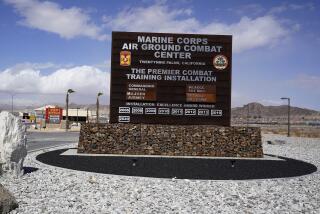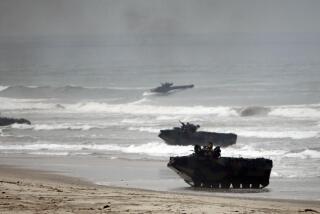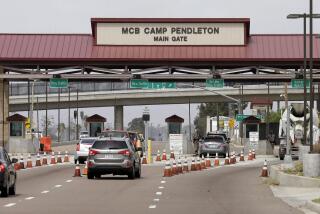Marines focus on Afghanistan as they improve theater readiness
CAMP PENDLETON — In the power corridors of Washington, there is debate about whether to send more U.S. troops to Afghanistan. But here at Camp Pendleton, the training and deploying of Marines, with a focus on Afghanistan, continue.
In the last two weeks, 2,100 Marines and sailors have left here on what is scheduled to be a six-month training mission in the western Pacific and Persian Gulf but could easily turn into a combat assignment in Afghanistan.
Two hundred special-forces Marines from Camp Pendleton are in the final stages of training before leaving for Afghanistan. And on Friday, the Marines reestablished the 1st Marine Expeditionary Brigade with the goal of becoming the overall Marine force in Afghanistan early next year.
“Much like in Iraq, success is going to be measured not in weeks, not in months, but in years,” Lt. Gen. Joseph Dunford, commander of the 1st Marine Expeditionary Force, said at a brief ceremony in which Brig. Gen. Joseph Osterman assumed command of the brigade.
Training here and at the base at Twentynine Palms, Calif., is being tweaked to reflect Afghanistan.
Afghan emigres are taking the place of Iraqi emigres as “role-players.” More emphasis is being placed on coordination between air and ground forces. A program is being established for explosive ordnance technicians to learn to thwart Afghan-style roadside bombs.
The Marines’ counterinsurgency strategy puts a priority on safeguarding the civilian population and training the Afghan army and police, not on confronting the Taliban. “You can’t kill your way out of an insurgency,” Osterman said.
The Marine force in Afghanistan, including an infantry battalion from Camp Pendleton, now numbers more than 11,000, under the command of a brigade from Camp Lejeune, N.C. Marine Commandant Gen. James Conway has said that the Marines could sustain a force between 15,000 and 18,000 in Afghanistan.
The amphibious assault ship Bonhomme Richard left San Diego on Sept. 25 with troops from the Camp Pendleton-based 11th Marine Expeditionary Unit. Two smaller ships left several days earlier.
The 11th Marine Expeditionary Unit is slated to train with nations friendly to the U.S. The Marines try to keep a unit afloat in the region at all times as a “force in readiness.”
Marines and sailors from the 15th Marine Expeditionary Unit, also from Camp Pendleton, were on leave in Australia on Sept. 11, 2001. They were immediately ordered back to their ships and, within weeks, were in Afghanistan bolstering Afghan forces in toppling the Taliban regime.
Other Marine expeditionary units in recent years have been deployed to Kuwait and Iraq.
“If we’re needed in Afghanistan, we’ll be ready to take on the enemy and the terrain,” Col. Gregg Olson, commander of the 11th Marine Expeditionary Unit, said in an e-mail. “We practiced many mission profiles that can be readily adapted to any geography or culture.”
In the briefings given to families before the 11th Marine Expeditionary Unit’s departure, parents and stay-behind spouses were warned that there was a possibility that the Marines would be sent to Afghanistan.
“It kind of woke them up,” said Dawn Jones, the unit’s family readiness officer.
The mention of Afghanistan, Jones said, drove home a message that is given to families before any deployment: that it is wise for every Marine and sailor to make out a will.
--
More to Read
Sign up for Essential California
The most important California stories and recommendations in your inbox every morning.
You may occasionally receive promotional content from the Los Angeles Times.









